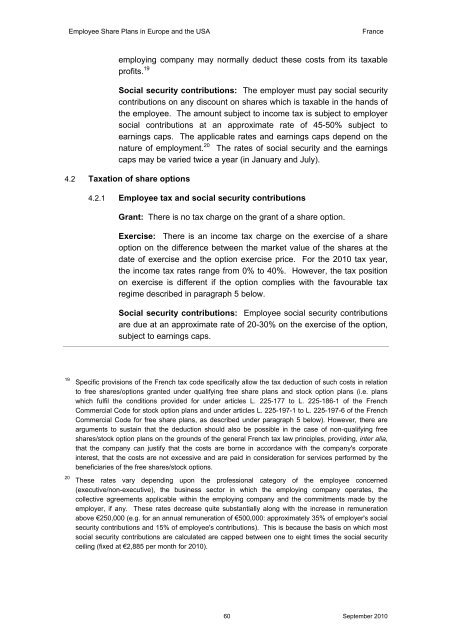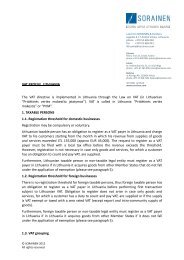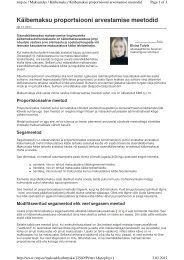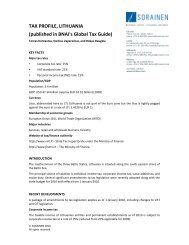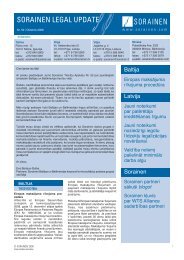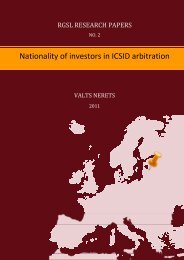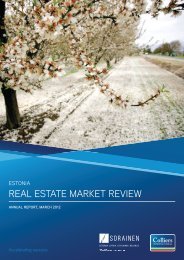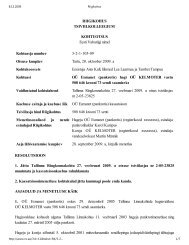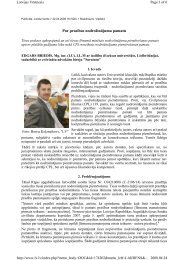Employee Share Plans in Europe and the USA - Sorainen
Employee Share Plans in Europe and the USA - Sorainen
Employee Share Plans in Europe and the USA - Sorainen
You also want an ePaper? Increase the reach of your titles
YUMPU automatically turns print PDFs into web optimized ePapers that Google loves.
<strong>Employee</strong> <strong>Share</strong> <strong>Plans</strong> <strong>in</strong> <strong>Europe</strong> <strong>and</strong> <strong>the</strong> <strong>USA</strong>Franceemploy<strong>in</strong>g company may normally deduct <strong>the</strong>se costs from its taxableprofits. 19Social security contributions: The employer must pay social securitycontributions on any discount on shares which is taxable <strong>in</strong> <strong>the</strong> h<strong>and</strong>s of<strong>the</strong> employee. The amount subject to <strong>in</strong>come tax is subject to employersocial contributions at an approximate rate of 45-50% subject toearn<strong>in</strong>gs caps. The applicable rates <strong>and</strong> earn<strong>in</strong>gs caps depend on <strong>the</strong>nature of employment. 20 The rates of social security <strong>and</strong> <strong>the</strong> earn<strong>in</strong>gscaps may be varied twice a year (<strong>in</strong> January <strong>and</strong> July).4.2 Taxation of share options4.2.1 <strong>Employee</strong> tax <strong>and</strong> social security contributionsGrant: There is no tax charge on <strong>the</strong> grant of a share option.Exercise: There is an <strong>in</strong>come tax charge on <strong>the</strong> exercise of a shareoption on <strong>the</strong> difference between <strong>the</strong> market value of <strong>the</strong> shares at <strong>the</strong>date of exercise <strong>and</strong> <strong>the</strong> option exercise price. For <strong>the</strong> 2010 tax year,<strong>the</strong> <strong>in</strong>come tax rates range from 0% to 40%. However, <strong>the</strong> tax positionon exercise is different if <strong>the</strong> option complies with <strong>the</strong> favourable taxregime described <strong>in</strong> paragraph 5 below.Social security contributions: <strong>Employee</strong> social security contributionsare due at an approximate rate of 20-30% on <strong>the</strong> exercise of <strong>the</strong> option,subject to earn<strong>in</strong>gs caps.1920Specific provisions of <strong>the</strong> French tax code specifically allow <strong>the</strong> tax deduction of such costs <strong>in</strong> relationto free shares/options granted under qualify<strong>in</strong>g free share plans <strong>and</strong> stock option plans (i.e. planswhich fulfil <strong>the</strong> conditions provided for under articles L. 225-177 to L. 225-186-1 of <strong>the</strong> FrenchCommercial Code for stock option plans <strong>and</strong> under articles L. 225-197-1 to L. 225-197-6 of <strong>the</strong> FrenchCommercial Code for free share plans, as described under paragraph 5 below). However, <strong>the</strong>re arearguments to susta<strong>in</strong> that <strong>the</strong> deduction should also be possible <strong>in</strong> <strong>the</strong> case of non-qualify<strong>in</strong>g freeshares/stock option plans on <strong>the</strong> grounds of <strong>the</strong> general French tax law pr<strong>in</strong>ciples, provid<strong>in</strong>g, <strong>in</strong>ter alia,that <strong>the</strong> company can justify that <strong>the</strong> costs are borne <strong>in</strong> accordance with <strong>the</strong> company's corporate<strong>in</strong>terest, that <strong>the</strong> costs are not excessive <strong>and</strong> are paid <strong>in</strong> consideration for services performed by <strong>the</strong>beneficiaries of <strong>the</strong> free shares/stock options.These rates vary depend<strong>in</strong>g upon <strong>the</strong> professional category of <strong>the</strong> employee concerned(executive/non-executive), <strong>the</strong> bus<strong>in</strong>ess sector <strong>in</strong> which <strong>the</strong> employ<strong>in</strong>g company operates, <strong>the</strong>collective agreements applicable with<strong>in</strong> <strong>the</strong> employ<strong>in</strong>g company <strong>and</strong> <strong>the</strong> commitments made by <strong>the</strong>employer, if any. These rates decrease quite substantially along with <strong>the</strong> <strong>in</strong>crease <strong>in</strong> remunerationabove €250,000 (e.g. for an annual remuneration of €500,000: approximately 35% of employer's socialsecurity contributions <strong>and</strong> 15% of employee's contributions). This is because <strong>the</strong> basis on which mostsocial security contributions are calculated are capped between one to eight times <strong>the</strong> social securityceil<strong>in</strong>g (fixed at €2,885 per month for 2010).UK/1729295/03 60 September 2010


